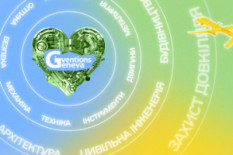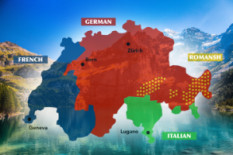Pawlo comes from a family of Ukrainian immigrants who were forced to flee from the USSR because his father was a soldier in the Ukrainian Insurgent Army. He was born in Poland, where his family settled at the time. Then the family emigrated to the United States. However, at the age of 16, Pawlo decides to return to Europe and goes to Switzerland to enter the conservatory.
He graduates from the conservatory in Lucerne, becomes a music professor at a college, and begins actively performing with symphony and chamber orchestras in London, Paris, Stuttgart, Washington, and New York. And at the same time, he never stops learning: Zurich University, Higher Music Academy, Geneva Conservatory, and the University of Surrey in Great Britain...
Pawlo Dlaboha becomes a renowned musician and leads an exciting and fulfilling life in Switzerland.
This wonderful country embraced him and became his second homeland. Still, he never forgot for a moment that he was Ukrainian and did everything to preserve and support his national identity, to be an ambassador of Ukrainian culture in Switzerland.
Naturally, at the first opportunity in 1989, he visited Ukraine and immediately began to establish Ukrainian-Swiss cultural exchange: he created a chamber orchestra in Lviv, toured various cities in Ukraine, organized tours of Ukrainians in Switzerland, conducted masterclasses for young talented musicians, and so on. Pavlo Dyaboha's experience is an impressive example of active and inspired Ukrainian engagement. We are happy that Mr. Dlaboha shared it with us.
Escape of the Family from the USSR
My father was a member of the UPA and in 1946 had to flee from Ukraine. He managed to reach Poland with fake documents. My mother, brother, and sister had to leave later, and they were caught. Considering that my father was with the UPA, they were facing, at the very least, deportation to Siberia. It almost happened, as my mother and the children were already sitting in the train carriage for departure, when they miraculously managed to buy their freedom from the guards... for a bottle of moonshine. This happened at the Ukrainian-Polish border. My mother immediately went to Poland in search of my father, and they were eventually reunited. We were fortunate because my mother's brother was the Supreme Judge of the Polish Army at the time. He helped resolve all the issues with documents for our parents.
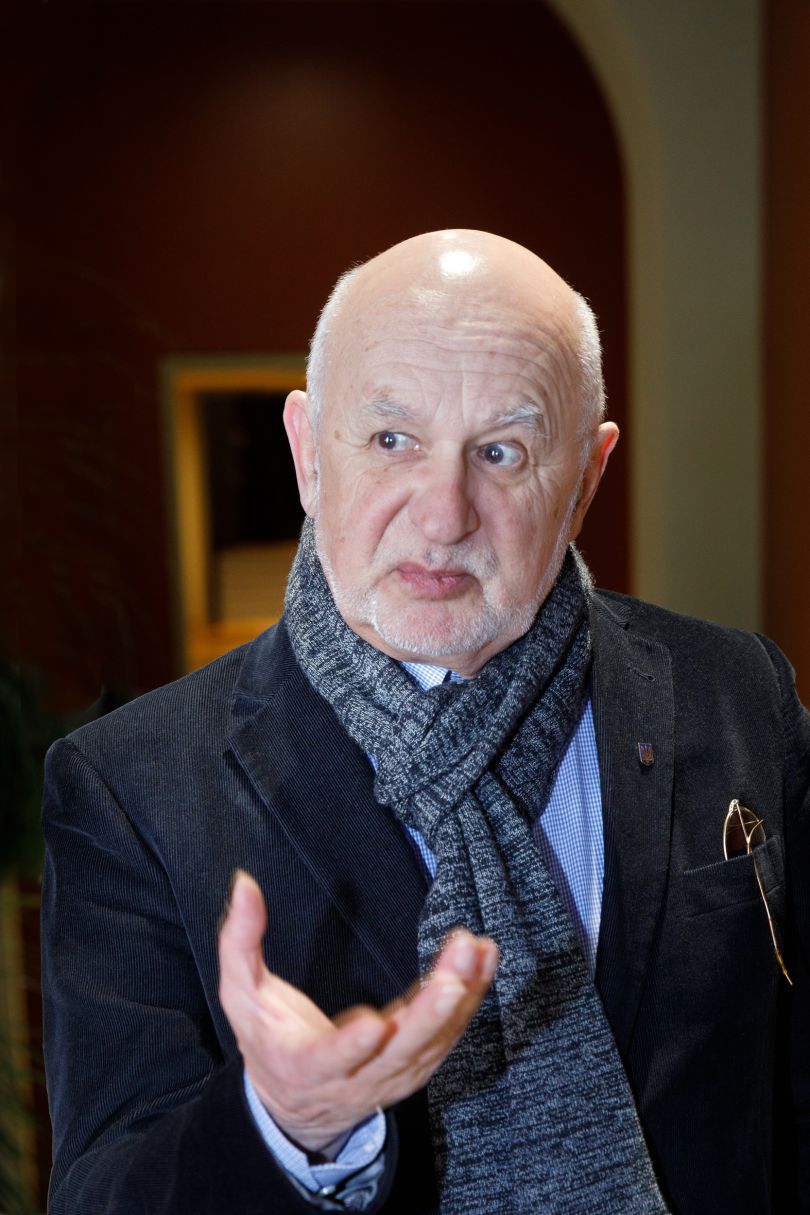 Pawlo Dlaboha at the Ukrainian Forum in the Swiss Parliament, Bern
Pawlo Dlaboha at the Ukrainian Forum in the Swiss Parliament, Bern
Life in Incognito
I was born in Poland, in Legnica, where our family settled. The first 10 years of my life were spent there. My father found a job, we had a wonderful house, and my mother had the opportunity to work on the farm. But we lived incognito. We spoke exclusively Polish at home. My parents could speak Ukrainian to each other only at night, but not with us. It was dangerous to reveal ourselves as Ukrainians. So, we passed as Czechs for official documents. When I listened to the teacher in the Polish school saying during a lesson that the Bandera supporters were enemies, that they shot Poles, and all those things, I, a little Bandera supporter, felt like a black person in white skin. That's how we lived. By the way, in Legnica, my father created the first choir on Polish radio.
Father's Abduction by KGB Agents
I remember when I was around six years old, my father didn't come back home one day. My mother immediately felt that something terrible had happened. And indeed, it turned out that my father was arrested by KGB agents, who were quite numerous in Poland, due to his involvement with the UPA. He was interrogated for several days. He never disclosed what happened to him there. He only said they threatened to harm our family if he didn't reveal everything. But he knew very little because he was just a simple soldier. When my father returned after a few days, he was different. He was in such a state that he couldn't cross the street on his own. The KGB had broken him mentally.
About Ukrainian DNA
Here we can talk about a Ukrainian phenomenon of consciousness. When we moved to the USA, there was no thought of us becoming Americanized. I felt like a Ukrainian living in America. And I think we didn't need to emphasize anything special. It was automatic for us, our DNA - we are Ukrainians. We started living in the States as a Ukrainian family. In the first year, I attended an American school, and then for three years, I went to an American-Ukrainian school, where I began to learn the Ukrainian language. I woke up in a Ukrainian bed and slept in a Ukrainian bed in the evenings. You see, we spoke Ukrainian at home and English with Americans. I think that emigration, everywhere in the world functioned the same way as our Ukrainian one. And there were never any conflicts. So, consciousness was in our genes. I believe that awareness of one's own culture is the foundation of a nation. We have our history, music, art, and poetry.
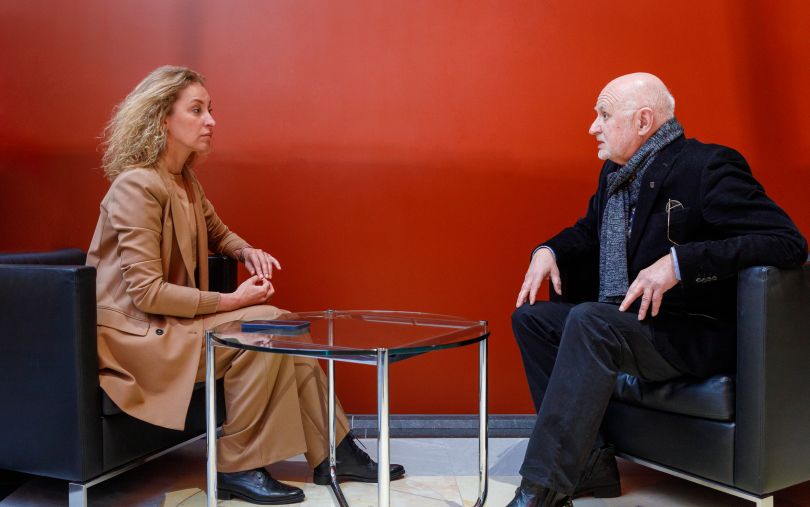 DestiNations editor Nataliya Kontsur, Pawhlo Dlaboha
DestiNations editor Nataliya Kontsur, Pawhlo Dlaboha
About Ukrainians in Switzerland
While in the USA, I longed for Europe terribly. So, I started writing letters to Swiss conservatories to apply for studies. I received a response from Lucerne, where they accepted me into the music institution after the entrance exam. But I always remembered who I was and where I came from. My father would send me the cultural-political monthly magazine "Suchasnist," which I read, not to forget the Ukrainian language. Because when I arrived in Switzerland, I had to learn German and French.
As for the Ukrainian Society in Switzerland, I joined its ranks when I was 17 years old. It was like a breath of fresh air and an opportunity to maintain my Ukrainian identity. At the end of the Second World War, there was only a small Ukrainian minority in Switzerland. This country was cautious not to spoil its relations with the Soviet Union. But we gathered not only to eat varenyky or holubtsi. A small whispering community decided to establish its Society because the hope for a Free and Independent Ukraine was always alive. We did our best to promote Ukrainian thought, culture, and history. We acted as ambassadors of Ukrainianism in Switzerland. At that time, it was very challenging to do so. We didn't have many opportunities to showcase ourselves. It was a kind of psychotherapy for all of us, a more emotional affair. Only after gaining Independence did we start moving much more actively.
Family Values
My mother was a superb singer. My father also sang in the Greek Catholic Church. So, singing was a family affair for us. My brother also sang and studied to become a choir conductor. His wife also has a fantastic voice. When we gathered around the table, we could sing for hours. It was a part of our life.
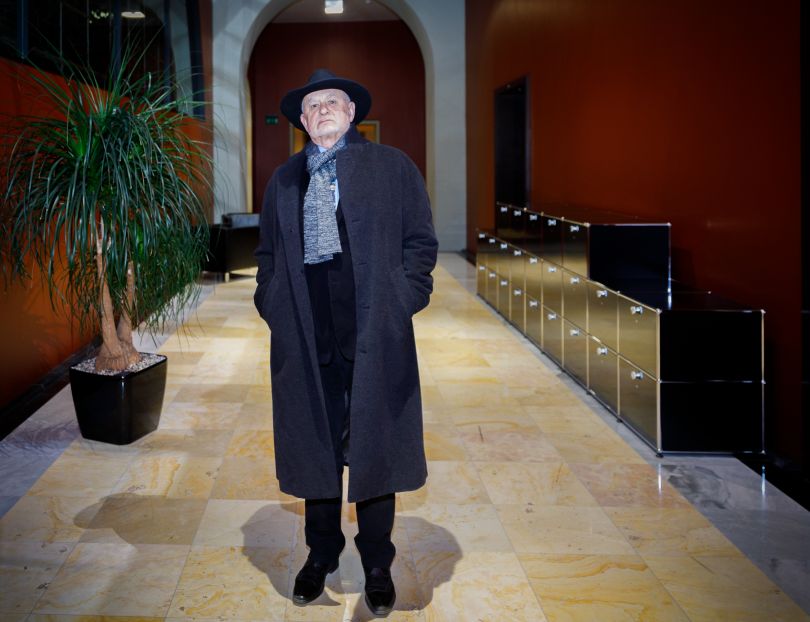 Pawlo Dlaboha in the premises of the Swiss Parliament
Pawlo Dlaboha in the premises of the Swiss Parliament
Opera Mayboroda and the FBI
So, it was 1988 - the christening of Rus-Ukraine, and I performed a concert version of Mayboroda's "Yaroslav the Wise" in the largest concert hall in Washington in front of 6,000 spectators. We also performed in Toronto and Philadelphia.
It was already a time when Perestroika was underway, so we started to collaborate a bit with Ukrainians from Ukraine. It was unthinkable just five years before. At that time, my brother managed to obtain fragments of the score of the opera "Yaroslav the Wise" through a Ukrainian singer who came from Ukraine. My brother lived in Philadelphia, where there was always a diplomatic mission, so people from that mission handed over the score. And within two or three days, a phone call came to my brother's house. He opens the door, and there are two well-dressed men on the doorstep speaking in English:
"Are you Mr. Mykhailo Dlyaboha?"
"Yes, that's me," my brother replied.
"We are from the FBI (Federal Bureau of Investigation)," they introduced themselves. "You had a meeting with some diplomats on the steps of the museum in Philadelphia, and they handed something to you. Can we know what it was?"
My brother showed them the folder - the score of the opera by the Ukrainian composer.
This story shows how it all began. It was difficult to have contact with Ukraine, even in basic matters.
Long-awaited meeting with Ukraine
I visited Ukraine for the first time in 1989. It was pleasant that I obtained a visa through Kyiv rather than Moscow.
I went with my wife, and she said, "Listen, we are being followed." I asked, "Who is following us?" And it turned out that young cadets were tailing us. To blend in with the tourists, they wore trendy "Nike" and "Adidas" clothing. That was the story.
I was one of the first musicians from the Western world to visit Ukraine. The main purpose of our visit was to promote cultural exchange between Switzerland and Ukraine. In 1998, I organized and led the chamber orchestra Camerata Leonis in Lviv, with which we toured Western Europe.
I also attended the first World Congress of Ukrainians in Kyiv. It took place at the "Ukraine" Palace. The then-president, Leonid Kravchuk, gave a speech. Later, during the break, as everyone entered the courtyard, correspondents approached and asked about Kravchuk's speech. I replied in Ukrainian (which surprised them) that I was amazed that he didn't mention Ukrainian culture even once. This spread throughout Ukraine. The next day, when I went to the Union of Ukrainian Composers, all the composers who approached me said only one thing, "Mr. Pavlo, you expressed everything skillfully."
In general, I was incredibly active in Ukraine. I visited Zaporizhia, Dnipro, and Kyiv for concerts. Towards the end of the trip, we even had a special performance in Lviv. Looking back at that time, I think I must have seemed like an alien from Mars to Ukrainians. People found it strange that I was Swiss, but before every concert, I would give a short speech in Ukrainian. At that time, it was pretty unusual for the residents of Ukraine.
"I am a cosmopolitan, fluent in five languages, but I always remain Ukrainian, everywhere and always. There is no question about it. It's not ideology or propaganda, not some kind of superpatriotism. It's a normal feeling of a conscious person who remembers who they are and where their ancestors come from," Mr. Pavlo emphasized at the end.
Image: Enis Yücel
